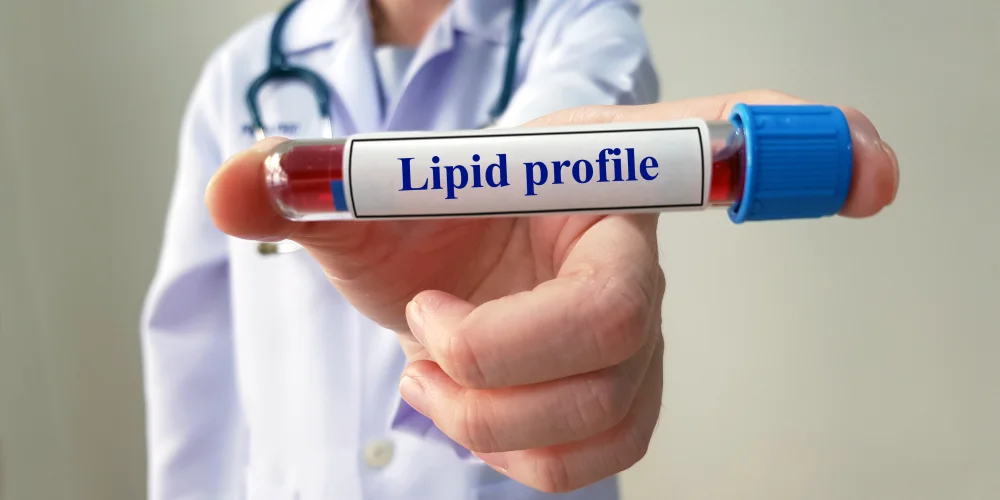Lipid Profile Test
Assessing Cholesterol and Triglyceride Levels
The Lipid Profile Test serves as a critical diagnostic tool used to measure essential blood lipids like cholesterol and triglycerides. These substances are vital for normal body function but can pose significant health risks when elevated beyond normal levels. By analyzing these lipid levels, the Lipid Profile Test provides crucial insights into cardiovascular health. It enables healthcare providers to assess the risk of developing heart disease, allowing for early intervention and preventive measures. Additionally, the test aids in planning appropriate treatments tailored to individual lipid profiles, such as lifestyle changes or medications aimed at reducing cholesterol levels and improving overall cardiovascular outcomes. Thus, the Lipid Profile Test plays a pivotal role in promoting cardiovascular health and mitigating the risks associated with abnormal lipid levels

When is the Lipid Profile Test Prescribed?
Lipid Profile Tests play an integral part in various clinical scenarios. They are an indispensable way of evaluating cardiovascular risk by measuring LDL (low-density lipoprotein) cholesterol – commonly referred to as “bad” cholesterol – which measures heart attacks and stroke risk. Furthermore, the Lipid Profile Test assists with diagnosing hyperlipidemia and hypoalphalipoproteinemia to guide effective management strategies; additionally for patients undergoing treatments like statin therapy regular Lipid Profile Tests may help monitor treatment effectiveness and adjust medication dosage accordingly.
Preparation for the Lipid Profile Test
Preparing for the Lipid Profile Test takes certain steps for accurate results, with fasting for 9-12 hours beforehand to allow fasting cholesterol levels to be accurately measured. Furthermore, inform your healthcare provider of any medications or supplements you are taking which could have an effect on lipid levels; some could require adjustment or temporary suspension before being subjected to testing.
Parameters Considered During Lipid Profile Test
Lipid Profile Test is an invaluable way to assess lipid metabolism and cardiovascular health by providing measurements on several key parameters. Total Cholesterol measures overall blood cholesterol levels including HDL (High Density Lipoprotein) and LDL (Low Density Lipoprotein). HDL cholesterol (also referred to as “good”) helps eliminate harmful levels from the bloodstream and therefore lowers heart disease risk, while LDL, or “bad” cholesterol, contributes to arterial plaque buildup thereby increasing cardiovascular risks. Triglycerides, another parameter measured, are blood fats associated with increased cardiovascular risk and can provide a comprehensive snapshot of lipid metabolism and cardiovascular health, aiding effective diagnosis and management strategies.
Time Required for Lipid Profile Test Results Report
Lipid Profile Test is an efficient procedure, typically taking only several hours from blood sample collection to result reporting. Results typically become available within 24 hours or even sooner so healthcare providers can quickly interpret them and take appropriate actions if needed.
Lipid Profile Test Price
At Chirayu SuperSpeciality Hospital, the Lipid Profile Test is priced affordably at ₹600. This cost-effective option ensures accessibility to essential diagnostic testing for cardiovascular health, supporting early detection and effective management of lipid disorders.
Book an Appointment for c Test
Booking your Lipid Profile Test at Chirayu SuperSpeciality Hospital is simple! You can schedule it online through our user-friendly website or reach out to our team directly. Both options offer prompt, professional services to meet all of your healthcare needs at our pathology lab in Bhayandar.
What Our Patients Say
Hear from our valued patients about their experiences at Chirayu Super Speciality Hospital and how our care has made a positive impact on their health and well-being.


Had my Lipid Profile Test done here. Smooth process and friendly staff. Will choose Chirayu Hospital for future tests.


Convenient appointment booking and affordable pricing for the Lipid Profile Test. Impressed with their efficiency.


The Lipid Profile Test report was detailed and easy to understand. Thank you to the team at Chirayu Hospital!


Accurate and timely results from Chirayu Hospital's Lipid Profile Test helped me make informed decisions for my patients.


Prompt service and comprehensive results for my Lipid Profile Test. Very satisfied with the care I received.


The Lipid Profile Test report was detailed and easy to understand. Thank you to the team at Chirayu Hospital!
Frequently Asked Questions
Here, we provide answers to some of the most commonly asked questions to help you better understand our services, policies, and facilities. If you have any additional questions, please do not hesitate to contact us.
It measures various lipids in the blood, including cholesterol and triglycerides, to assess cardiovascular risk.
Yes, fasting for 9-12 hours is generally required to obtain accurate fasting cholesterol levels.
It helps evaluate cardiovascular risk, diagnose lipid disorders, and monitor treatment effectiveness.
The frequency depends on individual risk factors and healthcare provider recommendations. Generally, it is recommended every 4-6 years for adults, more frequently for those with risk factors.